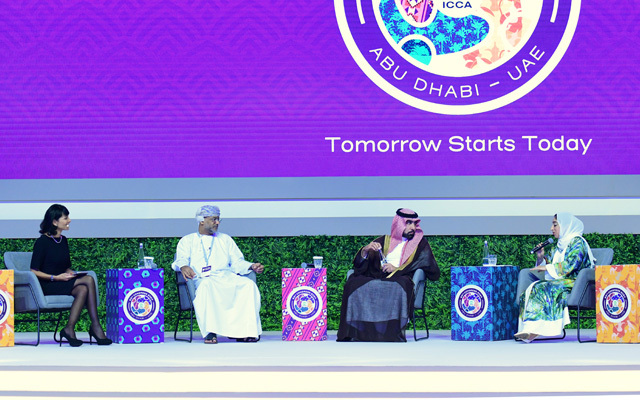
The Middle East is well-positioned to become a global business events and tourism powerhouse, fuelled by its rapid infrastructure development and varied tourism initiatives, according to panellists on the Shaping Tomorrow’s Horizon panel at the 63rd ICCA Congress in Abu Dhabi.
Fahd bin Abdul Mohsen Al-Rasheed, chairman of the board of directors, Saudi Conventions & Exhibitions General Authority (SCEGA), highlighted heavy investment in events infrastructure.

“In Riyadh alone, we’re building one million square metres of exhibition space, adding 7,000 hotel rooms, increasing airport capacity to 120 million passengers a year, and launching a new airline called Riyadh Air that will connect us with 100 new cities around the world,” he said.
He added that Saudi Arabia does not just want to attract international conferences, but seeks to “work closely with partners in the industry to create the next leading event”. As such, SCEGA will be “investing US$40 million next year” to incentivise the creation of new events.
Fatima bint Jaffer Al Sairafi, minister of tourism, and chairman of the Bahrain Tourism & Exhibitions Authority, spoke of the Kingdom’s five-year tourism strategy, where business tourism is a key pillar.
“A key project supporting that is Exhibition World Bahrain, which is a game-changer that has helped the Kingdom to position itself as a regional and international MICE hub. It is one of the biggest venues in the region with cutting-edge facilities,” she commented.
Although there is “a mandate to promote our countries independently as a MICE destination”, Fatima stressed that there is “real power when we promote our countries in the GCC collectively”.
The GCC (Gulf Cooperation Council) five-year, multiple-entry tourism visa that was launched in 2021 for 130 nationalities was instrumental in rebuilding the region’s business events and tourism industry post-pandemic, observed Azzan Qassim Al Busaidi, undersecretary of tourism at Oman’s Ministry of Heritage & Tourism.
A new GCC Grand Tours Visa, which allows tourists to travel freely across the six member states (Bahrain, Kuwait, Oman, Qatar, Saudi Arabia and the UAE) on a single visa, is expected to launch in late 2024 or early 2025.
Meanwhile, Fatima highlighted the importance of stakeholder engagement. “Air connectivity is vital, especially for international events. (In addition), exhibition centres can’t work independently, and need to (collaborate) with stakeholders such as the aviation sector, DMCs, and hotels,” she said.
Azzan concluded that the region’s business events industry has to target “unconventional and new markets” in order to achieve growth in the next 10 years.





















